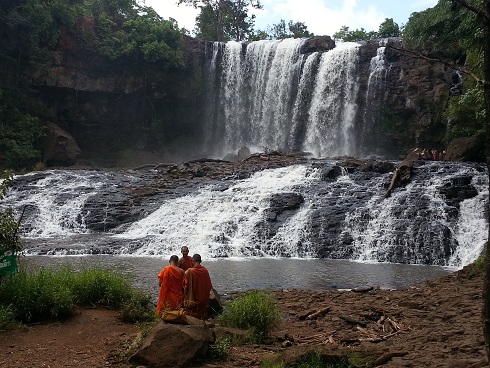IBJ in Mondulkiri Province
I have been working at IBJ in Cambodia for four weeks. Headquarted in Geneva, Switzerland, IBJ has programs in countries around the world, in Burundi, China, India, Rwanda, Zimbabwe, and, of course, Cambodia. The organization first came to Cambodia in 2001 at the invitation of a Cambodian non-governmental organization called Legal Aid of Cambodia in order to assist LAC in providing Cambodians with greater access to legal representation. Because the Cambodian government does not sponsor a national legal aid program, Cambodians who are accused of crimes and cannot afford a lawyer can only get free legal counsel through either IBJ or LAC. Although Article 301 of the Code of Criminal Procedure of the Kingdom of Cambodia requires that every person accused of a felony be represented at trial by a lawyer, in actuality, if such a person is too poor to afford a private lawyer and does not know about legal aid NGOs, then he will likely either be kept in pre-trial detention longer than the law allows (more than six months), or be tried without a lawyer for the sake of expediency, but equally illegally. Therefore, an essential part of IBJ's mission here is actually quite simple: to spread the word that Cambodians accused of crimes have the right under Cambodian law to ask for a lawyer after twenty-four hours of interrogation, and that they can obtain a lawyer for free through IBJ. Unfortunately, there are only twelve IBJ lawyers in the entire country. They work in nine "Defender Resource Centers" that IBJ has established in nine different provinces. There are four lawyers in the Phnm Penh DRC, because the Court of Appeals and Supreme Court are also located here, and one in each of the eight provincial DRCs. Of the twenty-four provinces in Cambodia, IBJ lawyers are able to offer their services in roughly seventeen, sometimes travelling great distances to cover the territory.
(Sen Monorom DRC)
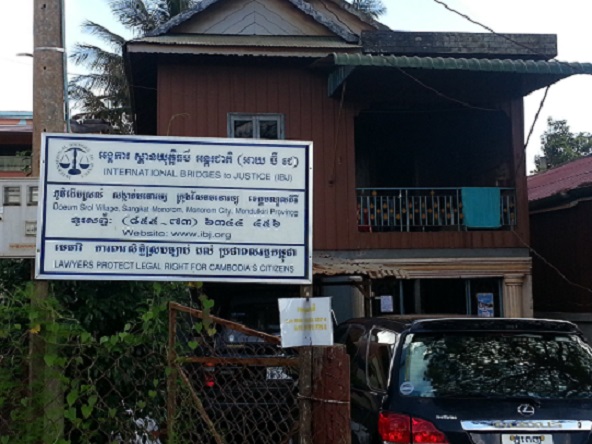
Two weeks ago, three people from the Phnom Penh office and I traveled six hours by minivan for a four-day trip to the Northwest province of Mondulkiri. We visited the IBJ lawyer, Makara, in the DRC of the provincial capital, Sen Monorom. The Phnom Penh office serves as IBJ's command center in Cambodia, so the staff here makes frequent trips out to the provinces to collect data and guage the success of IBJ's mission on the ground. That afternoon, we visited the judicial police headquarters to meet with the police chief. The judicial police is one of six branches of the police force in Cambodia. Although, apparently, the autonomy of the judicial police from the more powerful military police is debatable, the judicial police officers are meant to be at the service of the royal prosecutors and investigating judges in the lowest-level "courts of first instance." Rather than patrolling the streets, these officers investigate crimes that have already been reported and round up and interrogate those who have been formally accused through a "citation" or "immediate appearance order" issued by a prosecutor or investigating judge, sometimes at the behest of an ordinary citizen. We met with the chief to get his perspective on IBJ's strengths and weaknesses in Mondulkiri. Fortunately, he only had good things to say. According to him, the accused seem increasingly more aware of their rights and his own officers are increasingly more respectful of those rights during interrogations.
(Police Station)
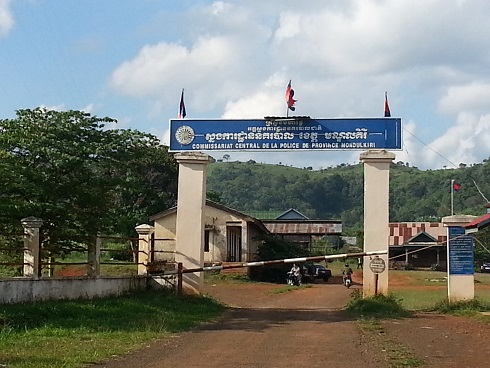
IBJ's mission, apart from providing free legal defense, is to educate people about their rights and train legal professionals, including judicial police officers, to implement the rights written in the law. Due to the Khmer Rouge's persecution of intellectuals and the political chaos of the following decade, by 1994 there were fewer than 10 lawyers in all of Cambodia. The lack of legal professionals contributed to a general societal ignorance about basic legal rights. Today there are roughly 700 practicing lawyers here, and the legislature recently updated the Code of Criminal Procedure and the Criminal Code in 2008 and 2011, respectively. However, the gap is often wide between the law on paper and in practice. To bridge this gap, IBJ DRCs conduct two different law clinics: one, called, "Street Law," for average citizens; the other, called, "Roundtable Discussions," for justice officials. IBJ also posts signs in the interrogation rooms and, increasingly (as its relationship with the General Department of Prisons strengthens), in pre-trial detention centers. The posters show the IBJ hotline number and a two-part, pictorial description of the right to a lawyer and to be free from torture.
Later that afternoon, I interviewed a former IBJ client through a translator. Gathering such "success stories" from clients is how IBJ both monitors its lawyers' work and keeps its donors informed. This particular young man, now twenty-three years old, was twenty-one when he was charged with drug trafficking, for which the minimum sentence is five years. Fortunately, his father had heard of IBJ and called Makara in Sen Monorom. The young man pleaded guilty, but Makara was able to persuade the judge to reduce his sentence to twenty months in consideration of mitigating circumstances like his youth, his desire to continue in school, and his prior clean record. Article 98 of the Code of Criminal Procedure permits judges such discretion in sentencing. The young man, by his own admission, had developped a habit of using methamphetamine. One afternoon, as he and six friends were returning to the capital, an undercover police official asked them if they had any drugs. When one of the young men tried to sell him some, all seven were arrested and charged as accomplices in drug-trafficking. Each man, therefore, faced the same penalty as the principle perpetrator.
The young men had been caught in the snare of the Cambodian government's crackdown on drug use, which especially targets poor Cambodians. From one perspective, the young man was, in fact, guilty; and, receiving a twenty-month sentence is better than receiving a sixty-month one. Without Makara to represent him, this young man undoubtedly would have served the entire five-year sentence. In fact, it is not too uncommon here for justice officials to "forget" about prisoners; so, he might have stayed in prison even longer than five years. From another perspective, however, even the twenty-month sentence cost this young man too much. During that time, his father passed away, and due to his criminal record he will have to overcome almost insurmountable difficulties to find a permanent job. Without money, of course, he will not be able to finish his education.
Honestly, my first reaction to his story was without much sympathy. Because he was guilty of at least using and possessing methamphetamine, the twenty-month reduced sentence, at least, seemed justified. His was not a "falsely accused" story (unlike the motorbike driver whom I interviewed last week and will write about in the next blog). However, my opinion softened after coming back to Phnom Penh and for the first time spending a Friday night in the bars and restaurants along the Mekong river. There, where mostly foreigners congregate, I witnessed the other side of the Cambodian government's dichotomous enforcement of its "drug laws". As early as 9 PM, nearly every tuk-tuk driver along the riverside will quite openly hawk all kinds of drugs to anyone passing by. They are so bold because they know from years of not-so-tacit mutual understanding, that 99% of the time justice officials will turn a blind eye. From personal observation and a few news articles, it seems to me that, on the one hand, the government strictly enforces drug laws against its own citizens, especially poor, uneducated habitual drug users, or the mentally handicapped, in order to beef up its anti-drug statistics, on which depends much of the foreign assistance it receives. On the other hand, the government willingly preserves a decades-old laxity in enforcing its drug laws against foreigners purchasing small-to-medium-sized quantities of narcotics, for the benefit of a "drug tourism" industry and, of course, the Cambodian drug bosses. In short, I became much more sympathetic when I considered all this young man has lost, especially the final months he could have spent with his father, for being a party to a transaction that I could make on any night in Phnom Penh, ninety-nine times out of one hundred without suffering any legal consequences. Click here to read the 2011 Human Rights Watch report "Skin on the Cable," which details the abuse of Cambodian accused drug users at "rehabilitation clinics."
(Makara Teaching Street Law)
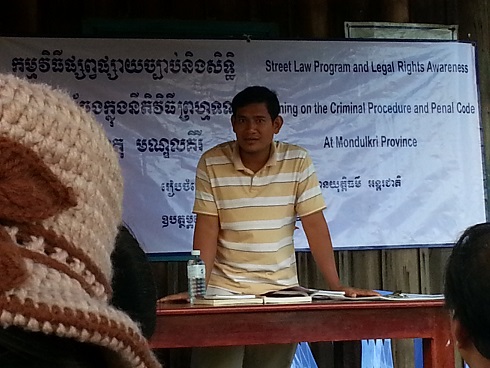
We spent the next day touring IBJ's activities in Sen Monorom with two monitors from AusAid, currently IBJ's biggest donor. We saw one of the monthly inter-organizational NGO meetings, where the handful of NGOs in Sen Monorom share their activities with each other and brainstorm ways to cooperate. At this meeting, for example, the IBJ staff in Sen Monorom spoke with a representative of the World Wildlife Fund, working there to combat illegal logging. IBJ hopes that WWF will refer cases when that organization becomes aware of any bottom-of-the-totem pole tree-cutters, the pawns and scape-goats of the criminal logging industry, being arrested. We also attended a Street Law class which Makara taught to a group of about twenty-five villagers. I was amazed that the seemingly basic "right" to be free from torture was so little known. Although the Cambodian public consciousness on torture has evolved in the past 15-20 years, there are still many villages where citizens accept the police's use of torture as if it were a lawful interrogation method.
We were free on the third day, so we enjoyed Mondulkiri's beautiful scenery. Because of the altitude, Mondulkiri is at least fifteen degrees cooler than Phnom Penh, and the refreshing breeze blows almost constantly. The terrain is so hilly and steep that walking anywhere involves a fairly strenuous climb. The lush, green surrounding forests seem to overrun the few developed parts of the small capital city. We visited Bou Sra waterfall about 10 miles outside Senmonorom. The roads were so rough that the trip lasted a full hour. The falls were strong, but not too powerful to keep us from sitting under them. That afternoon, we found one of the few places where the WiFi was working, called "The Treetop Lodge." It was ironic that the signal was strongest there because this group of bungalows was literally perched in the treetops of a remote section of the city, overlooking only the rolling forestland. It was a beautiful place to get some work done. We left the next morning at 7:30 and reentered the muggy swelter of Phnom Penh.
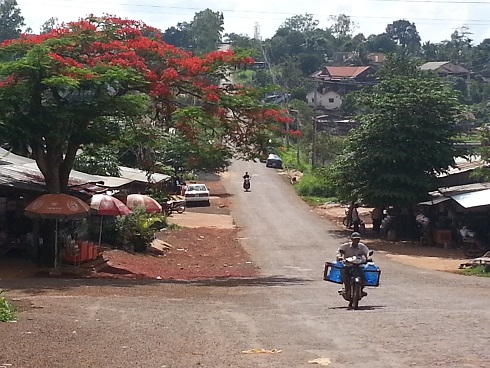
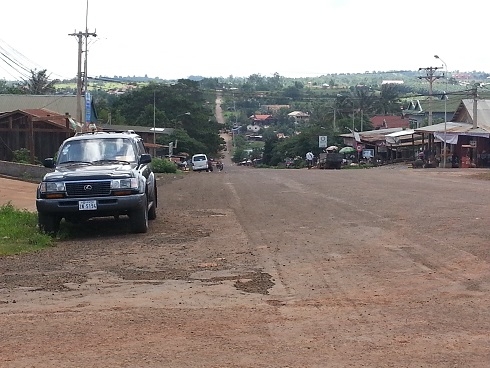
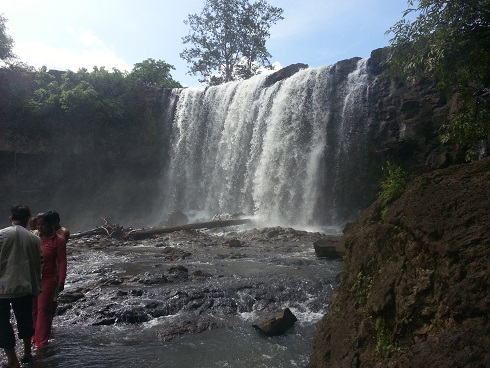
(Tree Top Lodge)
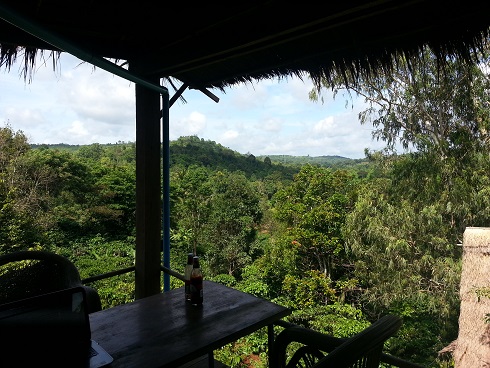
(Monks on Retreat at Bou Sra)
